1887 and 1888
1887 was, in terms of press coverage, a relatively quiet time. There is a report of a meeting in February that tells of Morris being elected a member of the Norfolk and Norwich Archaeological Society, and another in May heralding the publication of his Walsingham Abbey article as a separate booklet. The Golden Jubilee of Queen Victoria in June 1887 gave Morris the opportunity to preach on all his pet topics to a captive audience, at least half of whom, (judging by events the following year) were probably not inclined to listen too closely. The account of the events appeared in the June 18th editions of both the Norfolk Chronicle and more fully in the Lynn Advertiser and transcribed here:
RYBURGH GREAT. - Jubilee Celebration.- the unusual site of a flag flying on the top of the old Saxon tower of Great Ryburgh Parish Church and the still more unusual site of a flag flying from the ruins of Little Ryburgh church which is picturesquely situated on the summit of a hill overlooking the river Wensum, told that the Ryburghs were en fete, and ,for local reasons, were keeping their Jubilee demonstration a week in advance (Tuesday the 14th) thus leading off the ball in the county. The coming event had been foreshadowed on the Sunday previous, when the Rector preached two appropriate sermons on the Jubilee,- that in the morning from a church standpoint showing the progress and wonderful expansion of the church at home and abroad and the increase of education during the last 50 years ;and that in the evening explaining the nature of the Jewish festival of the Jubilee. The actual celebration began on Tuesday when an official procession set out from the National schools soon after 2 o’clock, consisting of over 200 children carrying flags, the staff of teachers, the organist (Mr Whyman) and choir, the Rector, supported by his two wardens (Messrs. Blomfield and H Smith), the parish clerk and other officials, headed by the Fakenham Volunteer Band. They marched straight to a meadow at the back of the Manor House, kindly lent for the occasion by Mr. G. Smith of Highfield. Here upwards of 500 parishioners were seated, with a sprinkling from Gately, Stibbard and Pensthorpe, and a bountiful dinner was provided for them, which was preceded by the short service put forth by authority. On arriving at the ground, the Rector, habited in his college gown, mounted the platform at one end of the table and began the service, the band with the choir being stationed at the other end, taking the musical parts and accompanying the Te Deum and Psalms. Mr. Whyman, the organist of the parish church, conducted, and the hymns were selected from the Jubilee Hymns lately published. At the conclusion of the service, the Rev. Morris Fuller made a short address, in which he contrasted the three previous Royal Jubilees since England became a nation with that of Her Majesty, both as to herself and the general prosperity. The beauty of the day suggested some apt illustrations of the meaning of “Queen’s weather”. A brief survey was then made of the last 50 years as to the Queen’s personal history, the growth of the Empire, the development of our political organisation, and the progress of the country in various ways; the contrast between the present state of religion and education to what it was 50 years ago being critically discussed. The speaker having enforced the three lessons on the Jubilee - the recognition of God’s over-ruling hand in the past, loyalty to Queen and country in the present ,and earnest prayer for the future - concluded by giving “God save the Queen” which was sung with the greatest enthusiasm. Dinner then commenced, which consisted of roast beef, bread, hot plum-pudding beer and tea and was keenly appreciated, the waiting being well arranged. There were many present who could remember the Queen's coronation, for Ryburgh is noted for its longevity, and the utmost unanimity and good feeling prevailed throughout the day. After dinner the athletic sports began in good earnest, and it took all the afternoon to decide the 18 events. Before, however they began, Punch and Judy was in great request, and proved as popular both to young and old as it was so years ago. The usual sports has been well arranged by the sports committee, and the trials of strength brought into prominence the strong brave spirits of the younger parishioners. Two very strong teams contested for the prize of the “tug-of-war” the malting team (Mrs Smith’s) beating the foundry team (Mr Cooper). A special prize of half-a-sovereign was given by Mr. Washington Hammond (Pensthorpe) for a “tug-of-war” between the Pensthorpe team and one selected from Mr Edgar Smith’s men, which resulted in a victory for the former. These contests produced great excitement and the events having been decided as the shades of evening fell on the scene the prizes both numerous and costly were distributed by Mrs. F Smith of the Mill House. The children (each of whom have received a bun on entrance to the ground )where regaled at tea in the course of the afternoon, 250 in number. Amusements were provided for them of the usual character, and dancing on the green took place in the evening to the enlivening strains of the band, who did their part extremely well. Everybody seemed thoroughly to enjoy themselves, and the Jubilee day will be a red-letter day, which the parishioners will never forget. The meadow, gay with flags, tents, likenesses of the Queen, mottoes, and filled with hundreds of people, presented a very gay and animated appearance, nor was there a single contretemps to mar the day’s proceedings. On the ground we noticed the Rector and Mrs. Fuller, the Misses Fuller, Mr. and Miss Whyman. Miss Hamond, Mr. and Mrs. Blomfield (Manor House) Archdeacon Mesney (from Borneo), Mrs F Smith and the Misses Smith and friends, Mrs G Smith and the Misses Goodwin, Mr Savory, Mr and Mrs George Smith (Wells), Messrs. Herbert and Edgar Smith, Messrs Cooper and Salisbury and other members of the committee, Miss Platten, Mr Richard Platten, Mr Robert Platten, the Misses Salisbury and friends, Mr Notley, Mrs Cross and Miss King, Messrs. Ranger, Bradley and Bradfield, and numerous visitors from Fakenham and neighbourhood. Great praise is due to the committee for their admirable management throughout, and though it may seem invidious to make comparisons, we must not omit to mention the great and untiring services rendered by Messrs. Cooper and Salisbury. When darkness supervened, a brilliant display of fireworks took place, and crowds poured in from all the locality around to witness the (to many) novel sights, and a most happy and successful day was brought to a close by ringing cheers for Her Majesty the Queen.
In the Lynn Advertiser for September 10th, there is what must be an "information supplied" write up of the Harvest Festival at St Andrew's. What prompted the inclusion of his Brighton College past life in such a practical way is not clear but it would tie up with an anniversary of 20 years since his ordination and leaving Brighton College where, as we have seen, he had been a scholar, with a brief career as an Assistant Classical Master following University. We also see again the name of Mr Whyman the organist appear in this report, a name that was to appear in connection with another incident that persisted in the locality after Morris Fuller left Ryburgh.
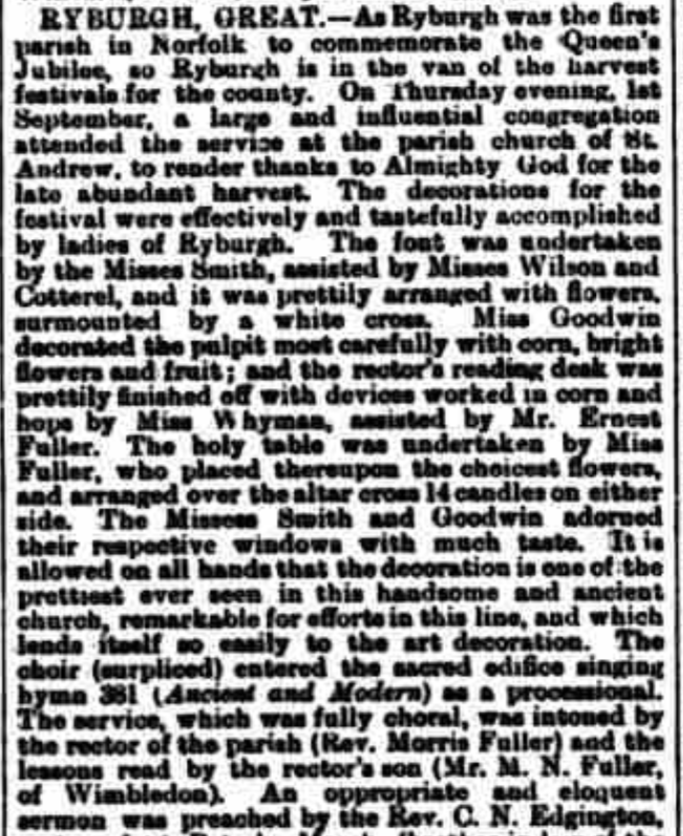
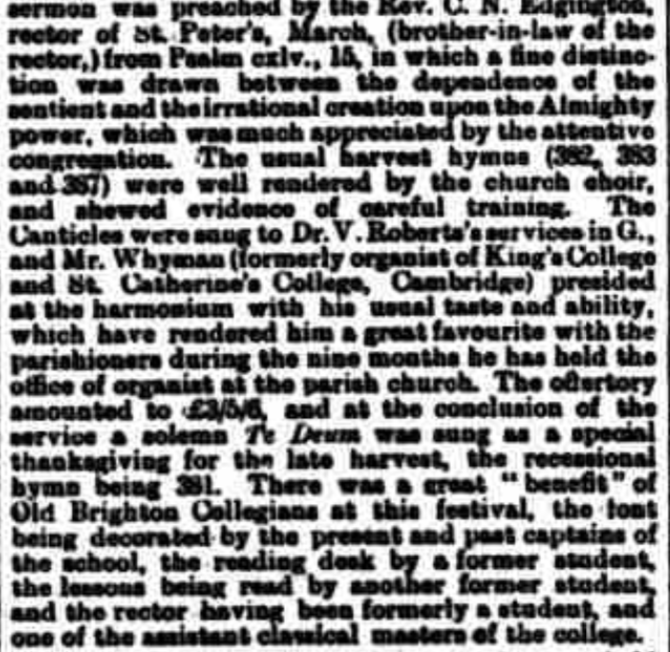
Ten days later, in the pages of the Shoreditch Observer on September 17th., was printed what would appear to be an encouraging report of the Boarding Out situation in Great Ryburgh. It gives no inkling at this point of what was to unfold the following year:
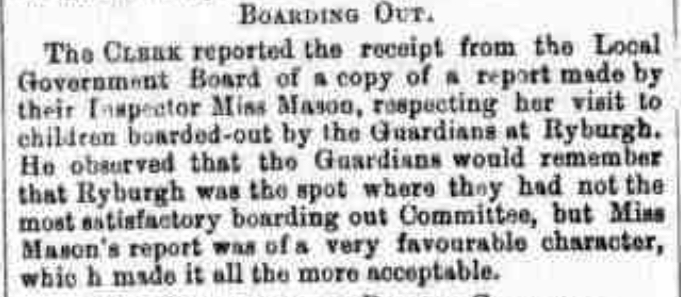
In the archives at Lambeth Palace (more specifically FP Temple 24 ff 132-133) there is a single letter dated 26th January 1888 from Morris Fuller to Frederick Temple, Bishop of London. It shows unequivocally his desire for pastures new but as former Bishop of Exeter during Morris' Devon years, Frederick Temple was well aware of his correspondent's background and likely qualifications for any post that he sought in his new Diocese. I am not entirely sure how much time is encompassed in the term "Winter" but we see from the following letter that the season was spent in Brighton at an address just round the corner from the Priory, so familiar to Morris in his youth. The letter reveals what is propbably as near as he ever gets to an admission that he is better suited to academe than the good old C.of E. The happenings during the remainder of the year gave him ever more incentive to find (for him) a user-friendly environment and as we can see in Part 11 this was not the first time that he had pursued a course of action to achieve such a placement:
11 Marlborough Street
Brighton
Jan. 26 1888
My dear Lord Bishop,
My friends are pressing my claims with the Government for the Crown living of St Bartholomew’s, Moor Lane, Cripplegate, and I have seen a letter this morning from Mr W.H.Smith in which he says that he is holding his hands for the present at the request of the Bishop L. From this I gather that your Lordship may have something to say to this appointment, and am writing to ask you to be kind enough should my name come up in your correspondence with Mr Smith, to say a good word to that gentleman, in favour of my candidature.
A City living would suit me better almost than anything else, as it would bring me near the British Museum and other libraries, where I might prosecute my studies in connection with Church Defence and the parochial work being comparatively light, I should have more time on my hands than in an ordinary cure - and am anxious to get into your Diocese. Your Lordship may remember that the Archbishop brought Mr. Moore up to the City living from Maidstone for this very purpose, & his investigations are very much in the same line as my own - which are much needed for the coming crisis.
By this post I am sending you my last article on the subject, and I have a large work in the press “Our Title Deeds” - which the Earl of Selbourne has permitted me to dedicate to him.
We are spending the winter in Brighton, and I am attached to one of the leading churches here where I am Morning Preacher.
Mrs Fuller joins me in kind regards, & wishing you all the Compliments of the season. I remain
Your Lordship’s faithful servant Morris Fuller.
This is overwritten with the Bishop of L[ondon], Frederick Temple’s reply:
Say that
the question un
der consideration is
whether St Bartholomew’s shall
not be merged in St Giles, and
that as yet I have no idea how that
question will be decided
As we already know from the pages of the "Scandal", 1888 was not a good year for Morris Fuller. The book however didn't reprint all the available press material and in researching the newspaper columns for verification of the book's contents I came across further reports of the "goings on" in our village. The pages of national papers as well as the Dereham and Fakenham Times have additionally the following tales to tell:
March 24th. 1888. Peoples Weekly Journal.(DFT)

March 31st. 1888. Peoples Weekly Journal.(DFT)

March 31st. 1888. Peoples Weekly Journal.(DFT)

If you have not already done so, now is time to read the Ryburgh Scandal. Here
November 24th 1888. Peoples Weekly Journal.(DFT)


Norfolk News of the same date was a little less shy about identifying the "public man":
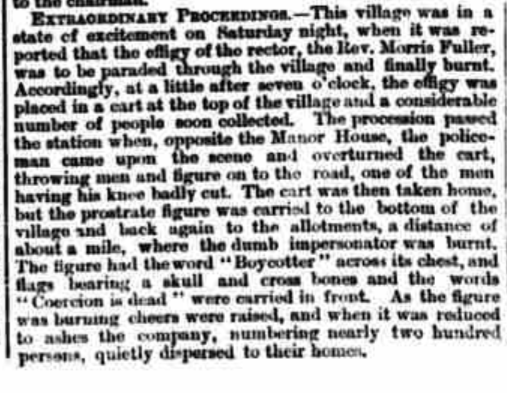
Clearly there was a serious issue brewing in the village and someone in the locality was intent on adding more fuel to the fire above as we see in this rather humourous account the following week in the Eastern Daily Press:
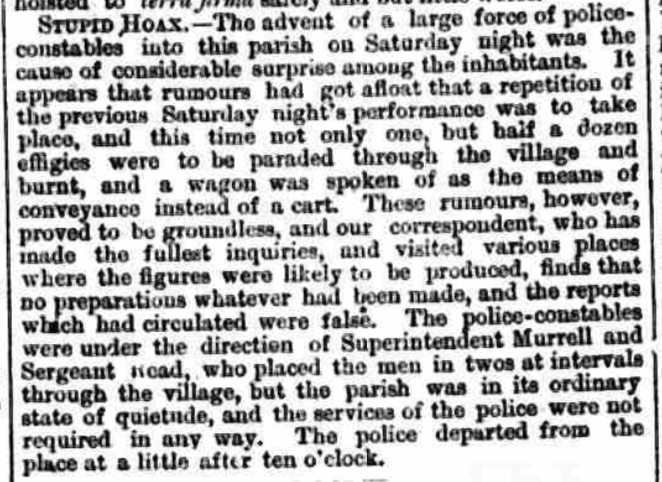
Having come to the attention of the local "korryspondent" in the "Village Chronicles" pages of the weekly publication "Daylight" during the period of the Scandal, there was no way that they would not wish to add their comments to the above event.
It is fortunate that they did, as it clears up speculation about "boycotting and coercion", and provides a link with the events of the Scandal earlier in the year and the way Fuller's attitude to Dissenters and opposition to prevailing government policies played out at the local level:
November 10th 1888
GREAT RYBURGH.
Bor, ef my tallyfoan* arnt mistook thare's anuther religious war a brewin' heer. Parson fare as ef he must be in hot warter wi' his flock insted ov bein' like his dear gude heavenly Marster, an' tryin' tew pour oil on the trubbled warters.
Yow remember, bor, when parson's wife libelled the hoal parish an' got it held up in orl the newspapers as wun ov the werry wicked and immoral places in the wurld. Wal, bor, an inhabitant collected orl the newspaper remarks on the subject intew a pamflet an' sowd it tew fooks an' a werry interestin' pamflet it wos, which everyboddy shood buy jest tew see how it is possibel fur a Minister of God an' his wife tew treet the poor fooks thay reseeve lumpin' gude wages tew preech the Gospel tew.Wall, bor, I'm towd as how Marster Oughton, the shopkeeper, had sum ov the aforesed pamflets tew sell, on hearin' wich parson got riled an' sed Oughton shoont hev nun ov the club people's cards for goods. The tother day wos the time fur distributin' these heer club cards an' my korrospondent, a werry reliable pusson, tell ontew me that parson’s wife left strickt instructions that Oughton warnt on anny account tew hev enny ov the cards. This ‘ere attitude ov parson an’ his wife tewards poor Oughton luke so much like boycottin’ which Balfour & Co. say is sich a horrid crime, that the fooks heerabowt are reglar in a huproar over it, bor.
I ORLSO am given tew onderstand as how when the members ov the clothin' club** went fur thare cards, parson giv 'em orl a gude lecksher, an' sed as how all Dissenters are as bad as atheists an' pagans, but I karnt see, bor, how dissenters can be wuss'n a charch Minister of God, and his wife, hew korl thare flock queer names, an' cause bad feelin' amung 'em, hay, bor? Now there's a lot ov Dissenters in the place, so yow can judge wot a werry wicked place it must be in parson's eyes. Parson say he doant know whot we shood be ef thare warn't a minister ov God amung us. Ef parson reckon he's a Minister ov God, I may say as how thare's an oncommon lot ov fooks in the place hew fare as ef they thowt we shood be a lot better ef we hant a Minister of God amung us.
THEY tell ontow me as how Marster Oughton met parson on Tewsday, an' hed a rare row wi' him. Parson, they say, got rite angry, bor, an' pushed Oughton away, sayin' " Git away, how dare yow tawk tew a gentleman like that." Fooks say as how it wos a werry amoosin' site tew see poor Oughton lukin' abowt fur the gentleman parson spook abowt. Howsomever, I'll pull up heer fur this week, but ef I arnt mistook, bor, there's goin' tew be sum funny capers cut heerabowt by parson an' his flock.
November 24th 1888
* The first Norwich telephone exchange was opened in early 1883. It operated from 8.30am to 6pm on weekdays and 8.30am to 10am at weekends.
** Read here all about 19th Century Clothing Clubs in Oxfrodshire
GREAT RYBURGH.
WAL, bor, wot I foresaw larst week hev happened, the ackshun of parson towards poor Marster Oughton in the matter ov them club cards, hev borne jest the werry fruit every sensible pusson must hev sen it wood.
A hoal willage of Englishmen cant set tamely down tew be libelled orl over the kingdom by even thare parson's wife, an' then hev a respectable tradesman badly tritted intew the bargain. The consekwens wos, that on Saturday nite, bor, there wos a regular hullerbelew heer. The hoal place was up in arms, an' at seven o'clock the effigy of wot they sed was parson, wi' the wurds "Boycotter" laid tenderly across his manly chist, wos werry lovingly placed in a cart and paraded threw the place. Grate Scott, bor, how the fooks ded haller, but when they got neer the Manor House a young bobby, hew evidently dint know his dewty, rushed at the kart an' upset it, and neerly brook a poor fellers knee. This heer ondew interference of the perleese kaused the yewthful kuntry image ov Warrenism tew be insulted. The poor young fewle is werry, whot is called, smock-faced, and a skrastick youngster had the imperence tew tell him tew go hoam and put his whiskers on. Then again, another skrastick chap towd him to go and fry his poor feet, but whether he hev follered this werry excellent advice, I karnt say. Orl I know is that arter sumboddy in the crowd had pointed owt how he wos actin' illegally, he fared to sing werry smorl. But I doant blame bobby, so much as I dew them, hew set a smock-faced yewth wi' everything tew learn, tew rule over his employers the ratepayers.
*****
Wal, bor, orlthow the cart wos upset by Bobby, fooks warnt agoin' tew hev thare fun orltewgether spoilt. They accordingly picked up the figger and carried it tew the allot-ments, whare it wos burnt. I orter say, bor, that flags bearin' a skull and cross boans and the wurds "Coercion is dead,"
wos carried in front of the figger. Parson is orful riled, bor, but he and his wos the fust aggressors, I consider, and the suner he make tracks from the place the better. Jest fancy Parson's Heavenly Marster actin' in the way Parson hev dun wi' regard tew a sheep ov his flock named Oughton! How can Parson, arter his attitood tew his flock, preech consientiusly a sarmon on that bewtiful text, " Blessed are the meek." Arnt it enuff tew make igerant fooks feel as ef religion is nowt but deseet ?
COUNTRY JOHNNY
December 1st 1888
GREAT RYBURGH.
WAL, I'm blarmed, bor, ef we aint a makin’ English History an' no mistake.
Parson an' his better harf hev set a werry pritty avarlansh rollin' which trettin, bor, tew reglar destroy the peace an' quiet ov the place. Bor, larst Satterday nite the place wos inwaded by a forse ov bobbies hew took possession ov the strits an' wos towd orf in kupples tew wotch for summot wot never happened. Bor, when the forse ov bobbies tarned up "hallo," ses sum ov our wiseacres
" heer's a taste ov Balfourism and Crime fur Englishmen. Heer kum the blarmed bobbies tew ewickt us an' lock us up fur barnin' parson's effigy larst week. Wal, things is kum tew a werry pritty parse onder this heer blarmed Tory Government when yow marnt say boo to Balfour in Ireland nor roost the effigay of a parson in England hewse wife hev libelled yow orl over the kuntry withowt bein' ewickted an' locked up. Alars! alars my onhappy kuntry. But, it haint got quite so far as that in Ryburgh yet. It fare as how these heer poor bobbies, bor, wos reglar hoaxed intew wisitin' our saloobrious willage, tew find a mare's nest an' stand larfin at the. young 'uns. Sum wicked wag started the rewmoor as how harf a duzzen effigies wos tew be barnt on Satterday nite an' sumboddy had the bobbies drowed orf from other places tew purwent the bit o' fun. Bor, tawk abowt effigies, Im blarmed ef them poor bobbies dint luke like effigies burnin' wi' shame an' no mistake when they fownd how they'd been tucked in. There they had tew stand an' be charfed by every little wulgar boy hew wos in the secret an' knew as how they'd been made Jerusalem ponies on. Warnt they glad, bor, wen ten o'clock kum an' they reseeved the order tew mizzle from the oncanny place hewse inhabitants burn their parson in effigy. But, bor, it's a sorry bisness tew say the best on it an' I ax parson tew trow up the sponge afore ennything moar serious kum ov it. He an' his wife wos the fust transgressors an' in the name ov his Holy Marster why doant they try tew heal the crewel wound they hev made in Ryburgh social life insted of aggrawatin' on it an' makin it wuss. Its nowt tew be ashamed on in honestly ownin' yow've made a grievous mistake. It oanly show as how yow're wiser tew day than ye wos yesterday. Kum! kum parson dew as I say or prepare tew take yar trot, thare's no middle course, bor.
Ryburgh December 1888
A Norfolk Rector Charged with Assault.
On Monday at Fakenham Petty Sessions, the Rev. Morris Joseph Fuller, rector of Great Ryburgh, was charged with unlawfully assaulting Gladwin Lewell Bradfield, assistant overseer of Ryburgh, on December 24th. The case attracted a good deal of attention. There were solicitors on both sides. The complainant was called. He said that on Christmas Eve, in consequence of a notice he saw on the church door, he attended a meeting in the vestry. The notice was in the Rector’s handwriting, and the meeting was to receive tenders for supplying coal. The Rector saw him in the porch, and said, “What do you want” Complainant replied that he had come to the meeting. Defendant retorted, “You have no business here,” and seizing witness by the collar, pushed him violently, so that the witness fell upon a form.-Henry Ely corroborated.- The Rector’s churchwarden and the parish clerk were called for the defense.- After their evidence the Bench retired, and in a short time found that an assault had been committed, but of too trivial a nature to warrant conviction. They also thought that the complaint was not bona fide, and that the case was of so trivial a nature that they refused to convict, expressing the opinion that the case would never have been brought forward but for the ill-feeling existing in the parish.
Meanwhile with all this going on its business as usual in St Andrew's:
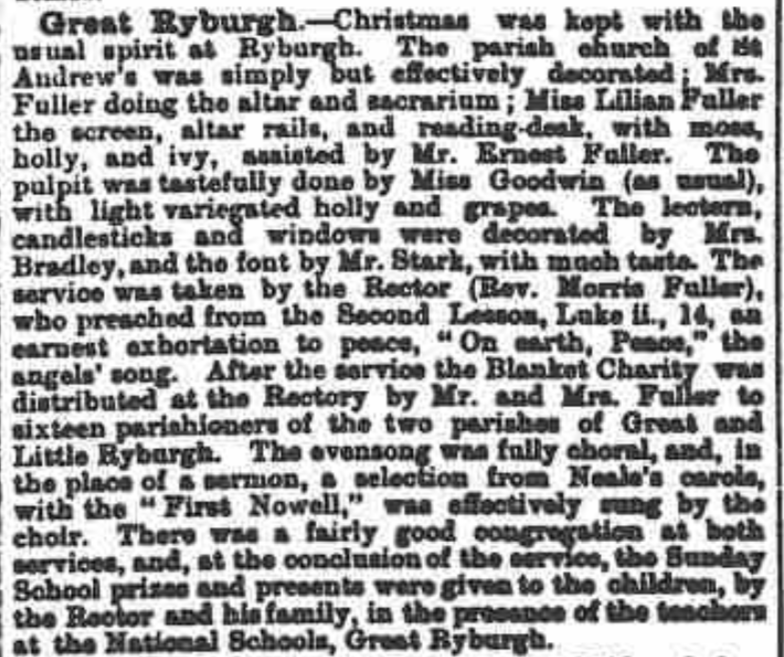
It would have to wait for the Dereham and Fakenham Times first edition of 5th January 1889 to retell the Court proceedings in full of the alleged assault made by the Rector on Christmas Eve 1888.